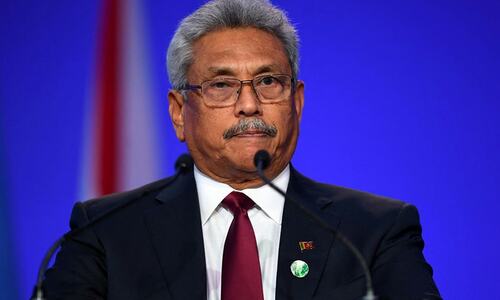COLOMBO: Known as “The Terminator” to family and foes alike for his ruthless crushing of Tamil rebels to end a decades-long civil war, Sri Lankan President Gotabaya Rajapaksa’s rule is drawing to a close with him a fugitive and his island’s economy in ruins.
Rajapaksa, one of a clan of four brothers who have dominated the country’s politics in recent years, was defence secretary under his brother Mahinda’s Rajapaksa’s presidency from 2005-15.
He denied allegations that at least 40,000 minority Tamil civilians were killed by troops under his command during the closing months of the war, but the accusations bolstered his tough-guy image in the eyes of the majority Sinhalese.
He was also considered the architect of “white van” abductions under Mahinda, when dissidents and journalists were grabbed in unmarked vehicles and disappeared, allegedly the victims of extrajudicial killings. He made no bones about winning the 2019 elections with the overwhelming support of his own majority Sinhala-Buddhist community.
For Sri Lanka’s influential Buddhist clergy he was the reincarnation of Sinhalese warrior king Dutugemunu the Great, who is known for vanquishing a Tamil ruler.
Dutugemunu reigned for 24 years, but Rajapaksa fled less than three years into his rule — and a resignation would make him Sri Lanka’s shortest-lived directly elected president.
The 73-year-old leader flew to the neighbouring Maldives on Wednesday, four days after his presidency crumbled and tens of thousands of protesters overran his official residence.
That came after months of demonstrations demanding his resignation over an economic crisis, triggered by the coronavirus pandemic but exacerbated by mismanagement.
The former soldier marketed his lack of political expertise as a virtue but Tamil legislator Dharmalingam Sithadthan said what Rajapaksa projected as his strength was actually his weakness. “His lack of political knowledge showed in the way he worked,” Sithadthan said. “He flip-flopped from one crisis to another. He thought by simply issuing orders things would materialise.
“Every time I met with him, he would say he is focused on the economy and law-and-order, but he failed in both.”
Rajapaksa came to power on a manifesto promising “Vistas of Prosperity and Splendour”, but according to the UN the country now desperately needs humanitarian aid.
The coronavirus pandemic hammered tourism and overseas remittances — both mainstays of the economy — leaving it facing a foreign exchange crisis.
Lengthy power cuts are in place as the country does not have dollars to import oil for generators, the nation’s 22 million people have been enduring acute shortages of food, fuel and medicines since late last year, and poverty is spreading.
Published in Dawn, July 14th, 2022














































